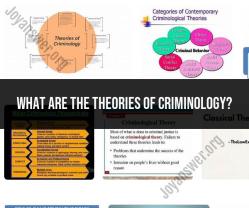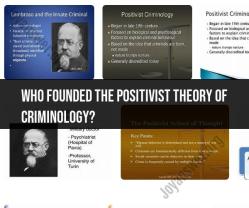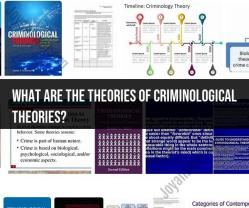What is positivist school of thought in criminology?
The Positivist School of Thought in criminology is a perspective that emerged in the late 19th century as a reaction to the Classical School of Criminology. It focuses on a more scientific and empirical approach to understanding the causes of crime and criminal behavior. Key concepts and ideas associated with the Positivist School of Thought in criminology include:
Determinism: Positivism emphasizes the idea of determinism, which means that human behavior, including criminal behavior, is not entirely a result of free will and rational choice. Instead, it is influenced by factors beyond an individual's control, such as biological, psychological, and social forces.
Scientific Method: Positivists advocate the use of the scientific method to study crime. This includes the collection and analysis of data to identify patterns and causal relationships. The goal is to apply the same rigorous methods used in the natural sciences to the study of human behavior.
Biological Factors: Positivists believe that some individuals may be predisposed to criminal behavior due to biological factors, such as genetics, brain abnormalities, or physical characteristics. The study of physiological traits, like the shape of the skull (phrenology) or the study of genes, has been a focus of positivist criminology.
Psychological Factors: The Positivist School considers psychological factors, such as personality disorders, mental illness, and abnormal psychological development, as potential contributors to criminal behavior. Psychiatric assessments and profiling are used to understand and predict criminal conduct.
Social and Environmental Factors: Positivists also recognize the influence of social and environmental factors, such as poverty, family background, peer associations, and neighborhood conditions, on criminal behavior. These factors are seen as significant contributors to criminality.
Prevention and Rehabilitation: The Positivist School emphasizes the importance of early intervention, treatment, and rehabilitation for individuals at risk of criminal behavior. Rather than solely focusing on punishment, they advocate addressing the underlying causes of criminal conduct.
Individualized Justice: Positivism supports the idea of individualized justice, where the criminal justice system considers the unique circumstances and factors contributing to an individual's criminal behavior when determining punishment and treatment.
Data-Driven Policy: Positivist criminology advocates for evidence-based policies and interventions. Decisions regarding crime prevention and criminal justice should be based on empirical research and data analysis.
Prominent figures associated with the Positivist School of Criminology include Cesare Lombroso, who introduced the concept of the "born criminal" and examined physical traits in relation to criminality, and Emile Durkheim, who explored the role of social factors in crime.
It's important to note that the Positivist School is just one of several schools of thought in criminology, and there is ongoing debate and discussion regarding the relative importance of biological, psychological, and social factors in explaining criminal behavior. Contemporary criminology often combines elements of positivism with other perspectives to provide a more comprehensive understanding of crime and its causes.
1. Understanding Auto Financing and Its Basics
Auto financing is the process of borrowing money to purchase a vehicle. The loan is typically repaid over a period of time, with interest. Auto financing can be obtained from a variety of lenders, including banks, credit unions, and auto dealerships.
2. Factors That Affect Minimum Amounts for Auto Financing
The minimum amount for auto financing will vary depending on a number of factors, including:
- The lender's credit policies: Different lenders have different credit policies, which can affect the minimum amount you can borrow.
- Your credit score: A higher credit score will generally give you access to lower interest rates and higher loan amounts.
- The down payment: A larger down payment will reduce the amount you need to borrow and can also help you qualify for a lower interest rate.
- The vehicle: The type of vehicle you are purchasing will also affect the minimum amount you can borrow. More expensive vehicles will typically require a higher minimum loan amount.
3. Loan Options and Lenders for Auto Purchases
There are a variety of loan options available for auto purchases. Some of the most common types of auto loans include:
- Secured loans: Secured loans are backed by collateral, which in the case of an auto loan is the vehicle itself. If you default on the loan, the lender can repossess the vehicle.
- Unsecured loans: Unsecured loans are not backed by collateral. This means that if you default on the loan, the lender cannot repossess the vehicle. However, unsecured loans typically have higher interest rates than secured loans.
You can obtain auto financing from a variety of lenders, including:
- Banks: Banks are a popular choice for auto financing because they offer competitive interest rates and terms.
- Credit unions: Credit unions are also a good option for auto financing, as they often offer lower interest rates and fees than banks.
- Auto dealerships: Auto dealerships offer auto financing, but the interest rates and terms may be higher than what you can find from a bank or credit union.
4. Strategies for Managing Auto Loan Terms and Amounts
When choosing an auto loan, it is important to consider the terms and amount carefully. Here are a few strategies for managing auto loan terms and amounts:
- Choose a shorter loan term: A shorter loan term will mean higher monthly payments, but you will pay less in total interest over the life of the loan.
- Make a larger down payment: A larger down payment will reduce the amount you need to borrow and can also help you qualify for a lower interest rate.
- Shop around for the best interest rate: Compare interest rates from different lenders before choosing a loan.
- Consider refinancing your loan: If your credit score has improved since you took out the loan, you may be able to refinance your loan at a lower interest rate.
5. Financial Considerations for Affordable Auto Financing
When considering auto financing, it is important to keep your budget in mind. Here are a few financial considerations for affordable auto financing:
- Consider your income and expenses: Before you start shopping for a car, make sure to consider your income and expenses. This will help you determine how much you can afford to spend on a monthly car payment.
- Shop around for the best deal: Don't just buy the first car you see. Take your time and shop around for the best deal on a car and a loan.
- Consider buying a used car: Used cars are typically less expensive than new cars, and they can be a great way to save money on your auto loan payment.
- Maintain your credit score: A good credit score will help you qualify for a lower interest rate on your auto loan.
By following these tips, you can find affordable auto financing that meets your needs and budget.





